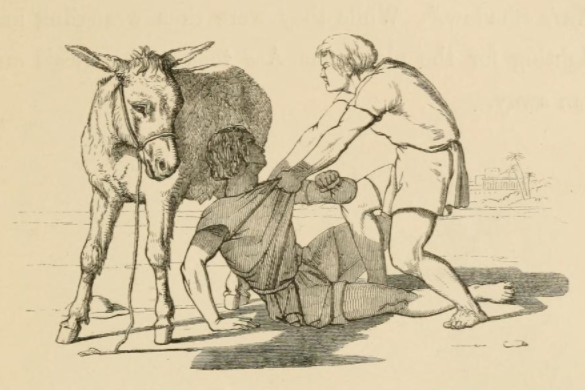Plus, I've also added something new today: a little audio, which you'll find at the bottom of the post. I'll try to keep up with audio daily, although I may end up just adding the audio at the end of each week if I fall behind. Each proverb is repeated 3 times, so I hope everybody will listen once and then read along with me, repeating twice. I'm not sure that the audio will appear in the email, but I've included a link that takes you to the SoundCloud playlist, and that link will work even in the email.
1. εἰς + acc.: to, into
1. εἰς + acc.: to, into
2. ἐπὶ + dat.: on, upon
3. περί + gen.: about, concerning
4. ὑπό + dat.: under, beneath
5. μεταξὺ + gen.: between
5. μεταξὺ + gen.: between
Here are the proverbs and sayings:
Εἰς κόρακας.
Κακὸν ἐπὶ κακῷ.
Περὶ ὄνου σκιᾶς.
Ὑπὸ παντὶ λίθῳ σκορπίος.
Μεταξὺ τοῦ ἄκμονος καὶ σφύρας.
Εἰς κόρακας.
To the crows.
Compare the English saying, "Go hang yourself" or just "Go hang." Why crows? The idea is that you want the person to die and for their corpse to be left unburied, a feast for crows. Unlike other prepositions which take different cases with different meanings, εἰς takes only the accusative case. Even so, the preposition still covers a huge range of meaning, as you can see at Logeion.
Κακὸν ἐπὶ κακῷ.
Bad thing upon bad thing.
Compare the English phrase, "one disaster after another." You saw another proverb in an earlier post which is similar to this one: Μὴ πῦρ ἐπὶ πῦρ. Note the difference in the cases with the preposition: Κακὸν ἐπὶ κακῷ (dative) is about one bad thing (already) on top of another, while Μὴ πῦρ ἐπὶ πῦρ (accusative) is about not adding fire onto the fire, expressing the idea of motion.
Περὶ ὄνου σκιᾶς.
Concerning the shadow of a donkey.
This saying is used to describe something worthless, a trifle of no value whatsoever, and certainly nothing worth arguing about. It was a popular ancient Greek saying as the many citations in Erasmus attest. I especially like the citation from Lucian: Πάντες ὡς ἔπος εἰπεῖν περὶ ὄνου σκιᾶς μάχονται οἱ φιλοσοφοῦντες, "All the philosophers are fighting, as the saying goes, about the shadow of a donkey." Erasmus also reports Demosthenes telling the fable about the donkey's shadow, which you can read here: The Ass's Shadow.
Ὑπὸ παντὶ λίθῳ σκορπίος.
Under every stone (there is) a scorpion.
So, you may want to "leave no stone unturned" (as the English saying advises), but this Greek proverb warns you to be careful when turning over stones: watch out for the scorpion underneath! As you can see, we get the word scorpion in English from the Greek σκορπίος.
Μεταξὺ τοῦ ἄκμονος καὶ σφύρας.
Between the anvil and the hammer.
Compare the English saying, "Between a rock and a hard place" — although I think the hammer-and-anvil of the Greek saying is more intense! Wham! The word μεταξὺ serves a preposition here, but it can also function as an adverb meaning "between-whiles, meanwhile."
Here is Tenniel's illustration for the Aesop's fable about the donkey's shadow

No comments:
Post a Comment